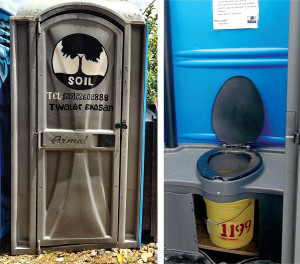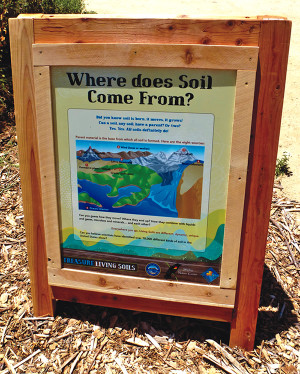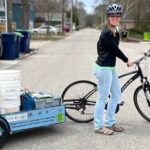BioCycle July 2014
Cap Haiten, Haiti: Mobile Compost Toilets
Since they were introduced in March, the EkoMobil compost port-o-potties developed by Haiti’s award-winning nonprofit Sustainable Organic Integrated Livelihoods (SOIL) continue to attract new customers. “We are currently planning a project with the United Nations to provide public mobile toilets for a prolonged period in a neighborhood in Cap Haitien where they will be doing a lot of construction,” says Sasha Kramer, SOIL cofounder. “And we continue to provide them for the school in Cite Soleil and to several construction sites in northern Haiti and soccer matches in the capital.”
 SOIL retrofits traditional port-o-potties with its simple EcoSan technology, putting a bucket or drum underneath the seat and providing cover material for “flushing.” UNICEF donated the traditional portable toilets to SOIL from a large supply it had after the earthquake in Haiti, explains Kramer, adding that they currently have 16 retrofitted toilets, eight in Port-au-Prince and eight in Cap Haitien. “These toilets smell much better than your average port-o-potty because they are dry and the drums are easily replaced each time they are full,” she says. “It is easy to have a supply of containers that seal when they are full, making it unnecessary for a truck to do collection each day.” The EkoMobil drums or buckets are collected every few days and brought to SOIL’s composting sites. As a result, notes Kramer, SOIL’s EkoMobils cost approximately a quarter to half the traditional port-o-potty price, largely because of less frequent collection and no need for specialized trucks, although prices for traditional port-o-potties vary widely.
SOIL retrofits traditional port-o-potties with its simple EcoSan technology, putting a bucket or drum underneath the seat and providing cover material for “flushing.” UNICEF donated the traditional portable toilets to SOIL from a large supply it had after the earthquake in Haiti, explains Kramer, adding that they currently have 16 retrofitted toilets, eight in Port-au-Prince and eight in Cap Haitien. “These toilets smell much better than your average port-o-potty because they are dry and the drums are easily replaced each time they are full,” she says. “It is easy to have a supply of containers that seal when they are full, making it unnecessary for a truck to do collection each day.” The EkoMobil drums or buckets are collected every few days and brought to SOIL’s composting sites. As a result, notes Kramer, SOIL’s EkoMobils cost approximately a quarter to half the traditional port-o-potty price, largely because of less frequent collection and no need for specialized trucks, although prices for traditional port-o-potties vary widely.
Boulder, Colorado: Eco-Cycle Widens Recycling Spectrum In Boulder County
In 1976, members of the Boulder community who had a driving interest in conserving resources founded Eco-Cycle, a nonprofit organization still based there today. Among its initial accomplishments was making Boulder one of the first communities in the U.S. to offer curbside recycling collection. Since then, Eco-Cycle has grown into a thriving social enterprise with over 70 employees. In addition to collecting blue-bin recyclables from Boulder County businesses and processing them at its Boulder County Recycling Facility (a materials’ recovery facility opened in 2001 that processes both residential and commercial blue-bin recyclables), Eco-Cycle supports organics recycling in Boulder County and operates the Center for Hard to Recycle Materials, also known as CHaRM.
In 2004, Eco-Cycle began a food waste collection service for commercial generators. “We provide generators with either a 64-gallon tote(s), 3 cubic yard (cy) dumpster(s), or roll-off compactor(s), that are serviced one or more times per week depending on volume generated,” explains Dan Matsch, Manager of Eco-Cycle’s composting and CHaRM divisions. “Collection containers are emptied, then rinsed with a power washer before being returned.” Eco-Cycle operates two rear-load modified trash trucks and one sealed box truck with a lift system to haul food scraps to A1 Organics’ Transfer Facility in Stapleton, where it pays $27/ton to unload. From there, material is taken to A1 Organics’ Rattler Ridge commercial composting facility in Keenseburg for processing. Eco-Cycle develops and carries out source separation and food scraps diversion trainings for businesses that participate in its commercial organics collection program. Boulder County also has a residential organics curbside collection program, which is serviced primarily by Western Disposal, a solid waste hauler and composter in the region. Eco-Cycle assists with training and advocacy for the residential organics curbside collection program. Other organics recycling initiatives that Eco-Cycle is involved in include: Facilitating zero waste events in Boulder County; Extensive recycling training at area schools; and Operation of two residential food scraps drop-off locations.
Eco-Cycle also has been actively involved in developing plans for a community composting facility in Boulder County. Although the project is still in the discussion phase, the organization has created a design for a facility that includes both an aerated static pile system in addition to a windrow pad for curing. “Because of extremely low landfill tipping fees in Colorado ($20/ton average), organics recycling infrastructure must be close to make organics diversion cost-competitive with landfill disposal,” explains Matsch. “For this reason, Eco-Cycle has included guidelines in its plans for the facility to be responsive to the regional community’s needs, including utilizing the finished soil amendments locally.”
One of the most unique services that Eco-Cycle provides to Boulder County residents is the CHaRM facility. Open seven days/week, the CHaRM accepts a very wide range of materials including electronics, scrap metals, small appliances, shoes, toilets, bicycles and more (link to complete list in online version of this item). In fact, the CHaRM was the first facility in the country to install a densifier for recycling postconsumer Styrofoam. “We try to add one new material every year,” explains Matsch. “We currently accept 24 different materials. When I am considering adding a new material, I must identify at least two potential markets for it. I determine the price we will charge to accept that material based on the lowest market value identified.” About 120 customers visit the CHaRM daily, where they are immediately put to work. “We practice the philosophy of getting the customer to do the most work as possible, which is mainly sorting the materials they bring in,” he adds. “Contamination in recycling markets is a huge deal, and we need to meet the specs of our processors if they are going to accept the material. This makes sorting hugely important.” Twenty percent of the CHaRM’s budget is subsidized by the city of Boulder, highlighting the community benefits of the facility.
Huntington Beach, California: Soil Health, Composting, Water Conservation Link
Living Soils — a new exhibit linking soil health, composting and water conservation — opened on June 21, 2014 at the Shipley Nature Center in Huntington Beach, a seaside community about 40 miles south of Los Angeles in Orange County. The nature center sits on 18-acres of restored California native habitat in Huntington’s 350-acre Central Park. Opened in 1974, Shipley receives tens of thousands of visitors annually, many of them children involved in various programs conducted on ecology, earth science and biology, among others. Programs for both adults and children include composting, vermiculture, water conservation, native plant and wildlife identification.
In addition to eight native habitats, the facility has an active composting and vermiculture program onsite, utilizing a dozen various units and selling both compost and worm castings to help fund the nonprofit, Friends of Shipley Nature Center (FSNC). A native plant nursery and a gift shop onsite are managed and staffed completely by FSNC volunteers, who also maintain the composting and worm units as well as the grounds.
Dedicated to promoting environmental sustainability, FNSC teamed up with the City of Huntington Beach and Orange County Master Gardeners to create the Living Soils Exhibit, a series of eight signs developed by Hidden Resources (a composting consulting firm) and Mousetrap Design. The signs help Shipley visitors understand the critically important but too frequently forgotten connection between healthy soil and the conservation and protection of surface and groundwater. Key topics on the signs include the link between soil health, food security and sustainable agriculture; human impacts on soil quality; the importance of the soil microbial community; and composting, vermiculture and environmentally friendly gardening and landscaping’s role in facilitating healthy, living soils. The exhibit will be used for a multitude of future workshops and training sessions.
Shipley has free admission and is open to the public Monday through Saturday, hosting numerous workshops and events year round. www.shipleynature.org.













